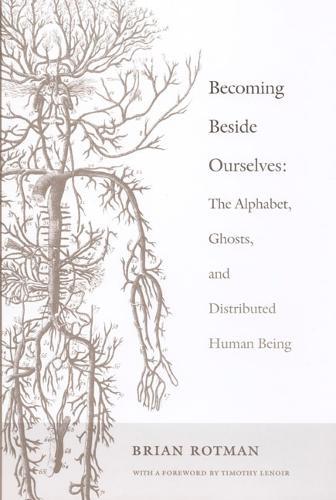Overview
Becoming Beside Ourselves continues the investigation that the renowned cultural theorist and mathematician Brian Rotman began in his previous books Signifying Nothing and Ad Infinitum...the Ghost in Turing's Machine: exploring certain signs and the conceptual innovations and subjectivities that they facilitate or foreclose. In Becoming Beside Ourselves, Rotman turns his attention to alphabetic writing or the inscription of spoken language. Contending that all media configure what they mediate, he maintains that alphabetic writing has long served as the West's dominant cognitive technology. Its logic and limitations have shaped thought and affect from its inception until the present. Now its grip on Western consciousness is giving way to virtual technologies and networked media, which are reconfiguring human subjectivity just as the alphabet did centuries ago. Alphabetic texts do not convey the bodily gestures of human speech: the hesitations, silences, and changes of pitch that infuse spoken language with affect.Rotman suggests that by removing the body from communication, alphabetic texts enable belief in singular, disembodied, authoritative forms of being such as God and the psyche. He argues that while disembodied agencies are credible and real to ""lettered selves,"" they are increasingly incompatible with selves and subjectivities formed in relation to new virtual technologies and networked media. Digital motion-capture technologies are restoring gesture and even touch to a prominent role in communication. Parallel computing is challenging the linear thought patterns and ideas of singularity facilitated by alphabetic language. Barriers between self and other are breaking down as the networked self is traversed by other selves to become multiple and distributed, formed through many actions and perceptions at once. The digital self is going plural, becoming beside itself.
Full Product Details
Author: Brian Rotman
Publisher: Duke University Press
Imprint: Duke University Press
Dimensions:
Width: 15.20cm
, Height: 1.50cm
, Length: 23.20cm
Weight: 0.318kg
ISBN: 9780822342007
ISBN 10: 0822342006
Pages: 277
Publication Date: 16 July 2008
Audience:
Professional and scholarly
,
Professional & Vocational
Format: Paperback
Publisher's Status: Active
Availability: In Print

This item will be ordered in for you from one of our suppliers. Upon receipt, we will promptly dispatch it out to you. For in store availability, please contact us.
Reviews
Becoming Beside Ourselves is a bold, provocative, and highly original argument about the relation between medial effects and changing manifestations of subjectivity. It traces a sweeping trajectory from what Brian Rotman calls the 'lettered self,' associated with alphabetic inscription and the codex printed book, to the subject as distributed assemblage associated with network culture. While others have made parts of this kind of argument before, Rotman's analysis is unique in placing special emphasis on gesture and revealing its traces in orality and print. In a brilliant synthesis, he mixes evolutionary theory with a Deleuzian view of agent-as-assemblage, arguing that computational media both reveal and perform distributed cognition as a crucial aspect of human being-in-the-world. Essential reading for anyone interested in the interrelations between computational media, contemporary subjectivity, and human evolution. -Katherine Hayles, University of California, Los Angeles Brian Rotman's exciting new text not only adds to his previous work on signifying technology (zero, infinity), it expands his study of abstraction to encompass the construction of subjectivity itself. Becoming Beside Ourselves will open up all kinds of unexplored terrains, from grammatology to psychoanalysis, from the history of technology to the study of culture and religion. -Fredric Jameson, Duke University
Rotman's brilliant treatment of gesture, speech, and their relations to other signifying systems moves consideration of the posthuman subject onto a new page of clarity and rigor. Timothy Lenoir, from the foreword Brian Rotman's exciting new text not only adds to his previous work on signifying technology (zero, infinity), it expands his study of abstraction to encompass the construction of subjectivity itself. Becoming Beside Ourselves will open up all kinds of unexplored terrains, from grammatology to psychoanalysis, from the history of technology to the study of culture and religion. --Fredric Jameson, Duke University Becoming Beside Ourselves is a bold, provocative, and highly original argument about the relation between medial effects and changing manifestations of subjectivity. It traces a sweeping trajectory from what Brian Rotman calls the 'lettered self,' associated with alphabetic inscription and the codex printed book, to the subject as distributed assemblage associated with network culture. While others have made parts of this kind of argument before, Rotman's analysis is unique in placing special emphasis on gesture and revealing its traces in orality and print. In a brilliant synthesis, he mixes evolutionary theory with a Deleuzian view of agent-as-assemblage, arguing that computational media both reveal and perform distributed cognition as a crucial aspect of human being-in-the-world. Essential reading for anyone interested in the interrelations between computational media, contemporary subjectivity, and human evolution. --Katherine Hayles, University of California, Los Angeles
Author Information
Brian Rotman is Distinguished Humanities Professor in the Department of Comparative Studies at Ohio State University. He is the author of several books, including Mathematics as Sign: Writing, Imagining, Counting; Ad Infinitum...The Ghost in Turing’s Machine: Taking God out of Mathematics and Putting the Body Back In; and Signifying Nothing: the Semiotics of Zero. Rotman has a doctorate in mathematics. Timothy Lenoir is the Kimberly J. Jenkins Chair of New Technologies and Society at Duke University.



